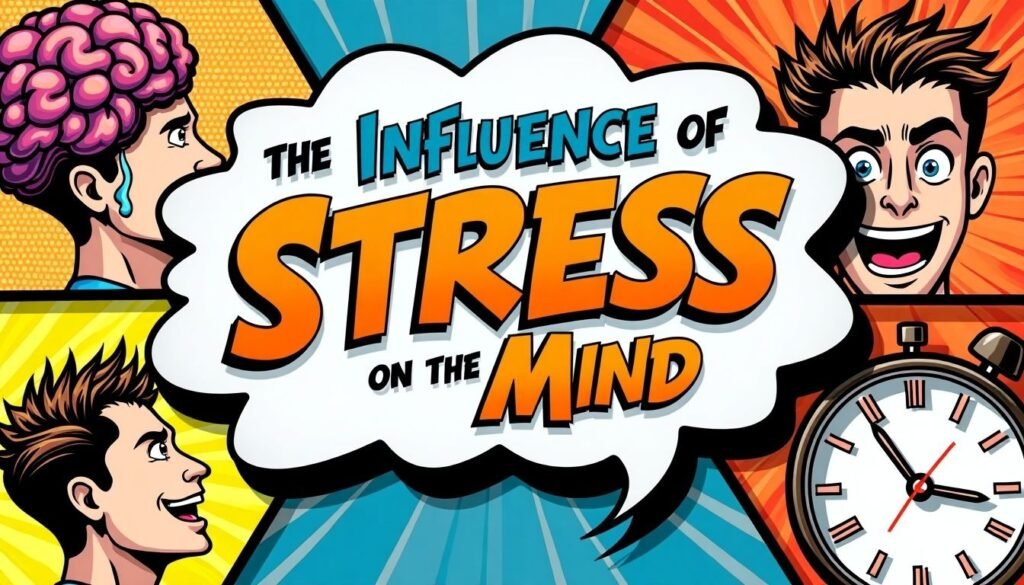Stress has a significant influence on the mind, often leading to feelings of anxiety and overwhelming pressure. When a person is under stress, their brain tends to go into overdrive, making it hard to focus or think clearly about tasks at hand. This can result in forgetfulness and difficulty in making decisions, which can further increase the levels of stress experienced. Moreover, chronic stress may affect mood negatively, causing irritability or sadness to become more frequent. It’s interesting how such a powerful emotion can distort our perception and reactions towards everyday situations; thus it’s important to find ways to manage and alleviate stress for mental well-being. Overall, understanding this connection between stress and the mind helps individuals take better care of their mental health in fast-paced lives we live today.
Emotional Well-being of Startup Founders

Startup founders often face immense pressure to succeed, which can lead to prolonged stress and anxiety. The nature of their work frequently involves long hours, contributing to burnout and a lack of work-life balance. This imbalance can strain personal relationships, as time and energy are overwhelmingly directed towards business priorities. Additionally, the demands of the role often result in feelings of isolation, as founders may have limited time to nurture social connections.
The emotional well-being of founders is crucial for effective decision-making and leadership. High stress levels can impair judgment and negatively influence leadership styles, affecting team dynamics and overall business performance. The startup culture, which sometimes glorifies overworking, can exacerbate these challenges, pushing founders to neglect self-care and their emotional health.
Despite these challenges, awareness and proactive steps can help maintain emotional health. Founders can benefit from setting boundaries to establish a healthier work-life balance, seeking support networks to combat isolation, and prioritizing self-care to manage stress. By fostering emotional well-being, founders not only enhance their personal health but also improve their ability to lead effectively through the uncertainties of the startup journey.
Mental Health Challenges in the Startup World

The startup world is known for its high-pressure environment, where founders are constantly battling against high failure rates. This atmosphere can take a toll on mental health, with financial instability being a major contributor to stress. The relentless competition often leads to chronic anxiety, as founders feel the need to constantly outperform their peers. Additionally, rapid changes and growth can leave founders feeling overwhelmed, struggling to keep up with the pace.
Imposter syndrome is a common issue, where founders doubt their abilities despite evident success. The pressure to meet investor expectations further amplifies these mental health challenges. Unfortunately, many startups lack adequate mental health resources, which exacerbates these problems. Founders often fear judgment and, as a result, hesitate to seek help. This can lead to decreased productivity, creating a vicious cycle.
For example, a startup founder might experience sleepless nights worrying about securing the next round of funding. This anxiety can lead to burnout, affecting decision-making and overall business growth. The absence of support systems means these individuals often suffer in silence, feeling isolated in their struggles. Addressing these challenges requires a cultural shift towards prioritizing mental health support within the startup ecosystem.
| Mental Health Challenge | Description |
|---|---|
| High Failure Rates | High failure rates in startups can affect mental health. |
| Financial Instability | The financial instability of startups adds to stress levels. |
| Competitive Environment | The competitive environment can lead to chronic anxiety. |
| Overwhelmed by Changes | Founders may feel overwhelmed by rapid changes and growth. |
| Imposter Syndrome | Imposter syndrome is common among startup founders. |
| Lack of Resources | The lack of mental health resources can exacerbate problems. |
| Pressure from Investors | Pressure from investors can increase mental health issues. |
| Decreased Productivity | Mental health challenges can lead to decreased productivity. |
| Lack of Support Systems | There is often a lack of mental health support systems. |
| Fear of Judgment | Fear of judgment can prevent seeking mental health help. |
Low Engagement with Mental Health Professionals

Many startup founders often overlook the importance of mental health support, not fully aware of the resources available to them. This lack of awareness can leave founders struggling on their own, as they may not realize the benefits that mental health professionals can offer. Moreover, the cost of therapy can be a significant barrier; many founders operate on tight budgets, making it difficult to justify the expense.
There’s also a prevalent fear among founders that seeking help might be perceived as a sign of weakness, which is compounded by the stigma that still surrounds mental health treatment. Busy schedules further complicate the situation, as finding time for therapy sessions can seem impossible amidst the demands of running a startup.
Confidentiality concerns may deter some founders from seeking professional help, worried that their personal struggles might become public or affect their business reputation. Additionally, the startup culture itself often undervalues psychological well-being, focusing heavily on productivity and success at the expense of mental health.
Many founders underestimate how mental health support could enhance their personal and professional lives. Unfortunately, the number of mental health professionals who specialize in the unique challenges faced by startup founders is limited, making it even harder for them to find the right support. Addressing these barriers is essential to encourage more founders to engage with mental health services and improve their overall well-being.
Perceived Stigma Around Mental Health Support
Many individuals fear that admitting mental health challenges might damage their reputation, leading to social isolation and worsening conditions. For startups, founders worry about judgment from peers and investors, feeling pressure to appear invulnerable. This belief, often rooted in cultural norms, contributes to the misconception that successful leaders don’t face mental health issues. Such stigma equates these challenges with incompetence, stifling open discussions. The lack of mental health role models in the startup community exacerbates the issue, while social media often showcases only the highlights, fostering unrealistic expectations. Overcoming this stigma requires a collective effort to normalize conversations about mental health and present a more balanced view of success and leadership.
Concealing Stress and Vulnerability
Founders often feel the need to hide their stress to maintain a strong image, fearing that showing vulnerability might affect their team’s morale. However, concealing emotions can significantly increase mental strain. This practice can prevent individuals from seeking help when it’s needed the most, leading to a lack of support from peers. Stress and vulnerability are often mistakenly seen as weaknesses, but pretending to be invulnerable can damage personal relationships and delay addressing underlying issues. Over time, the continuous concealment of stress can lead to burnout. On the other hand, open communication about stress can foster a healthier work environment, encouraging support and understanding among team members.
- Founders often hide stress to maintain a strong image.
- Concealing emotions can lead to increased mental strain.
- Many fear that showing vulnerability might affect team morale.
- Hiding stress can prevent seeking help when needed.
- Concealing issues can lead to a lack of support from peers.
- Stress and vulnerability are often seen as weaknesses.
- Pretending to be invulnerable can damage personal relationships.
- Hiding stress might delay addressing underlying issues.
- Long-term concealment can lead to burnout.
- Open communication about stress can foster a healthier work environment.
Limited Communication with Investors
Founders of startups often experience pressure to present only positive outcomes to their investors. This pressure can lead to limited communication, which in turn can cause misunderstandings and mistrust. When communication is not transparent, it becomes challenging to align expectations between founders and investors. However, open and honest communication can help manage these expectations effectively. Investors who are aware of the challenges faced by a startup can provide crucial support and advice, which can be invaluable for the growth and success of the business. Despite the fear of losing funding, regular updates and transparency about challenges and solutions can build stronger relationships and trust. This transparency is appreciated by investors and can lead to better alignment and cooperation. On the other hand, limited communication can hinder progress and success, highlighting the importance of clear and consistent dialogue.
Ongoing Efforts in Founder Mental Health Research
Recent research has underscored the unique mental health challenges that founders face, particularly highlighting the high prevalence of depression and anxiety. In response, there is a concerted push towards developing support systems tailored specifically for founders. These efforts aim to integrate mental health awareness into the core of startup culture, making it an integral part of everyday operations. The growing interest from investors in the mental well-being of founders is encouraging, as it helps destigmatize mental health issues in the startup ecosystem. New tools and interventions are being designed and tested to enhance founder well-being, with promising collaborations between academia and industry driving these initiatives forward. To gain a clearer understanding of these mental health trends, there is a call for longitudinal studies that can provide insights over time.
Frequently Asked Questions
1. How does stress affect our thoughts?
Stress can make our minds feel cluttered and harder to think clearly. When stressed, people might find it tough to focus or remember things.
2. Can stress change how we feel emotionally?
Yes, stress can make us feel more anxious, sad, or even angry. It can impact our mood and how we react to different situations.
3. What are the ways stress influences decision making?
Stress might lead us to make quick decisions without thinking things through. It can also cause us to doubt ourselves or feel overwhelmed by choices.
4. Does stress affect our physical health too?
Absolutely, stress can lead to headaches, sleep problems, and even affect our heart health. It connects with both the mind and the body.
5. What can we do to manage stress better?
Simple things like exercising, talking to someone, or taking deep breaths can help. Finding time to relax and doing things you enjoy also helps manage stress.
TL;DR The blog explores how stress affects startup founders, highlighting emotional well-being’s critical role in decision-making. It discusses challenges like burnout, isolation, and imposter syndrome while emphasizing the need for mental health support and reducing stigma. With limited communication and a desire to maintain a strong image, founders often conceal stress, impacting personal and professional relationships. The piece calls for open communication with investors and highlights ongoing research aimed at developing founder-specific mental health resources, which are crucial for sustainable success in the startup ecosystem.

